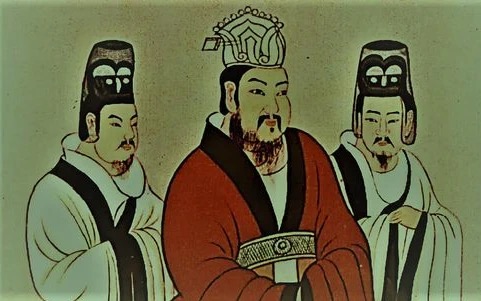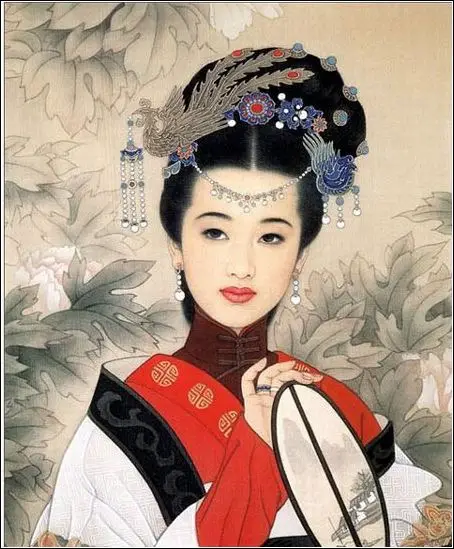For those unfamiliar with Chinese history, Emperor Yang (or Sui Yangdi) reigned as the Sui Dynasty’s 2nd monarch from 604 to 618 CE. His rule is often cited as one of the most oppressive in Chinese history, despite his many accomplishments. This article will introduce the historical character Sui Yangdi, discuss the reasons he has been a divisive figure, and discuss his lasting impact on China.
Who was Sui Yangdi?

Second emperor of China’s Sui Dynasty, Sui Yangdi (or Emperor Yang) reigned from 604 to 618 CE. In 569 CE, as Yang Guang, he was born as the second son of Emperor Wen, the founder of the Sui Dynasty.
Before becoming emperor, Emperor Yang served as a prince under his father’s rule, during which time he participated in military campaigns to expand the empire. When Emperor Wen passed away, his 24-year-old son, Yang, became emperor. After the fall of the Han Dynasty in 220 CE, China was split into separate northern and southern kingdoms, and he became famous for his ambitious plan to reunite them.
The building of the Grand Canal, which ran from the northern end of the Yellow River to the southern end of the Yangtze River, is widely regarded as one of Emperor Yang’s most notable accomplishments. In addition to facilitating travel and commerce between various parts of China, the Grand Canal also held the record for the longest artificial waterway in the world at the time. This endeavour also aided in the unification of the empire by making it easier to transport troops during military campaigns.
The Sui Empire’s borders were expanded by Emperor Yang, who led several successful military campaigns, including ones against the Korean kingdom of Goguryeo and the Turkic nomads to the west. Short-term victories were achieved, but the empire’s resources were severely stressed, and widespread discontent and rebellions were sparked as a result.
Extravagance and opulence were also hallmarks of Emperor Yang’s life and persona. For himself and his family, he constructed several lavish palaces, gardens, and mausoleums, which drained the local population’s resources and forced them to work long hours. High taxes and forced labour were imposed on the populace by Emperor Yang to fund his ambitious projects and military campaigns, resulting in widespread suffering and discontent.
Though he did much good, Emperor Yang’s reign is often maligned due to his divisive policies and questionable behaviour. In addition to ordering the deaths of his own brothers and committing atrocities against the people of Goguryeo, he gained a reputation for his brutality as a result of his military campaigns. The Sui dynasty fell because of his lavish spending and repressive policies.
Why was Emperor Yang so bad?

One of the most divisive figures in Chinese history was Emperor Yang, also known as Sui Yangdi. Although he has a long list of accomplishments to his name, including the building of the Grand Canal and numerous military victories, he is also widely regarded as a cruel and oppressive ruler.
The extravagance and opulence of the Emperor Yang’s lifestyle was one of his major flaws. Large amounts of labour and tax revenue were collected from the populace to fund the construction of lavish palaces, mausoleums, and gardens for him and his family. His extravagant spending on himself and his court contributed greatly to the decline of the empire and its subsequent fall.
The high taxes and repressive policies enacted by Emperor Yang only served to further damage his reputation. A large portion of the population was hurt by the high taxes and mandatory labour he instituted to fund his numerous military campaigns and grandiose projects. Conflict and uprisings spread as a result of his policies, which widened the gap between the wealthy elite and the rest of society.
Even on the battlefield, violence and cruelty were hallmarks of Emperor Yang’s campaigns. During his campaigns in Korea, he ordered the deaths of his own brothers and committed atrocities against the Goguryeo people. As a result of these deeds, he became known as a cruel and bloodthirsty ruler.
Religion-related policies instituted by Emperor Yang were also criticised. He upheld Buddhism and Daoism but banned Confucianism and Zoroastrianism. Furthering the loss of precious cultural relics, he also ordered the destruction of several Confucian temples and books.
accomplishments of emperor yang of the sui dynasty

Emperor Yang of the Sui Dynasty had a checkered reputation, but he left an indelible mark on Chinese history with several important accomplishments.
Building the Grand Canal
The Grand Canal, which ran from the northern Yellow River to the southern Yangtze River, was one of his most significant achievements. In addition to facilitating travel and commerce between various parts of China, the Grand Canal also held the record for the longest artificial waterway in the world at the time. This endeavour facilitated communication and understanding between people all over the empire.
conflict that requires military intervention
The Sui Empire’s borders were expanded by Emperor Yang, who led several successful military campaigns, including ones against the Korean kingdom of Goguryeo and the Turkic nomads to the west. In the short term, these campaigns succeeded in expanding the territory under imperial control. Also, Emperor Yang restructured the military to make it more efficient and effective in battle.
Restructuring the Agricultural Sector
As an added bonus, Emperor Yang also enacted numerous progressive agricultural reforms during his rule. To increase harvests and lessen the likelihood of famine, he implemented innovative new methods. A more secure food supply and a rising population were two outcomes of his policies, which also increased agricultural productivity.
religion
During his reign, Emperor Yang also made efforts to spread Buddhism and Daoism. He helped spread Buddhism and Daoism in China by constructing temples and monasteries and funding the translation of religious texts. He was also an advocate for learning, having funded the founding of multiple prestigious educational institutions.
examination system fit for a king
The keju system was formally established in 605 AD, when Emperor Yang of the Sui Dynasty created the imperial examination system. Candidates were admitted based on how well they performed on the imperial examinations, which at the time primarily tested their knowledge of current events and policy proposals (known as shice). Despite the lack of a standardised procedure for the imperial examination at the outset, the general framework for education, examination, and appointment to government positions was already in place.
Encyclopaedia written in Chinese
Once again, it was during Emperor Yang’s reign that great strides were made in the arts and sciences. Many of the palaces, gardens, and tombs he commissioned are still standing as monuments to Chinese culture and architecture. He also funded the first Chinese encyclopaedia and several other significant literary works.
Emperor Yang of the Sui Dynasty: His Life, Times, and Legacy
Despite the many complaints about his reign, Emperor Yang had a significant impact on Chinese history. His rule is remembered as a pivotal time of growth, unification, and cultural exchange in China. The Grand Canal was just one of Emperor Yang’s construction projects that helped open up trade and communication across China and boost the economy. The foundation for a more efficient and fair legal system in China was laid by his legal and administrative reforms, such as the Sui Code.
Moreover, Emperor Yang’s military campaigns and expansion of the Sui Empire paved the way for the Tang Dynasty, which became one of the most prosperous and influential periods in Chinese history. The Tang dynasty carried on many of Emperor Yang’s initiatives, using diplomacy, trade, and military campaigns to increase China’s global standing.
Sui Yangdi’s wife

Sui Yangdi’s wife was the Empress Xiao, or Xiao Deyan as she was also known. Her father, Xiao Zhengde, was the minister of justice during the Northern Qi dynasty. Sui Yangdi, then a crown prince, wed the stunningly brilliant and politically astute Empress Xiao in 605 AD.
Empress Xiao was by Emperor Sui Yangdi’s side as a trusted advisor and confidante for the majority of his reign. She accompanied him on his military campaigns and was known for her diplomatic skills in dealing with foreign powers.
Some of Empress Xiao’s many charitable legacies to her subjects included hospitals and orphanages. Both a patron of the arts and a key figure in the spread of Buddhism across China, she helped finance the careers of poets and artists working in the imperial court.
Overall, Emperor Yang of the Sui Dynasty was a complex figure whose reign was marked by both great achievements and controversy. A visionary leader, he united and strengthened China through military conquests, construction projects, and administrative and legal reforms. His legacy is marred, however, by the wastefulness and brutality of his reign as well as the demise of his dynasty. To say that Emperor Yang was instrumental in setting the stage for the Tang Dynasty and shaping Chinese culture over the course of centuries would be an understatement.